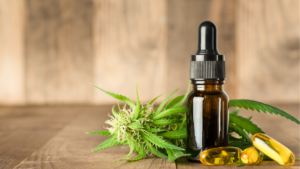We’ve seen a significant increase in Delta-8’s popularity over the last year and this could be attributed to its current legal standing at the federal level. However, as it’s gaining popularity, states are beginning to regulate. Delta-8 is currently legal in 30 states, but before we dive into the confusing legal grey area (that seems to come with anything cannabis related), let’s review what exactly Delta-8 THC is.
What is Delta-8 THC?
Delta-8 THC is one of the cannabinoids produced naturally by the cannabis plant, but is not found in significant amounts of the cannabis plant. Concentrated amounts of Delta-8 THC are typically manufactured from hemp-derived cannabidiol (CBD). However less psychoactive than Delta-9 THC, Delta-8 THC still has similar psychoactive and intoxicating effects to Delta-9 THC, the cannabinoid most popular in the cannabis plant for getting people “high”.
The two compounds are almost identical in structure except for the location of a double bond. The double bond is found on the 8th carbon in Delta-8’s structure and the 9th carbon in Delta-9. This difference of the double bond location makes Delta-8 less potent, meaning that individuals may be able to tolerate more per administration. The effects of Delta-8 have been reported by users as mild euphoria, happiness, uplifting feelings, and relief of pain.

Delta-8 THC Federal Legal Standing
Delta-8’s current legal standing is controversial on the federal level. Interpreting it as legal is due to a loophole through The Farm Bill. In 2018, the Farm Bill removed hemp with very small concentrations of THC from the definition of marijuana in the Controlled Substances Act. Hemp is defined as products derived from the cannabis plant containing less than 0.3% of Delta-9 THC. Tetrahydrocannabinol’s are listed by the DEA as a Schedule I drug, “except for tetrahydrocannabinols in hemp“. Delta-8 THC is primarily derived from CBD and contains low concentrations of Delta-9 THC, therefore the compound has been interpreted as fitting the hemp definition.
Delta-8 THC State Legal Standing
Many states have begun to regulate Delta-8 THC due to the lack of research on its effects and considering it is synthetically derived.
Delta-8 THC is currently prohibited or illegal in these 15 states: Alaska, Arizona, Arkansas, Colorado, Delaware, Idaho, Iowa, Louisiana, Mississippi, Montana, New York, North Dakota, Rhode Island, Vermont, and Utah. The reasoning for the ban of Delta-8 THC products can be summed up by the Colorado Department of Public Health and Environment as “chemically modifying or converting any naturally occurring cannabinoids from industrial hemp is non-compliant with the statutory definition of ‘industrial hemp product’.”
Connecticut, Michigan and Nevada regulate Delta-8 THC the same way they do recreational cannabis.
In Nebraska & Kentucky, the legality is unclear. Both states have “tetrahydrocannabinols” on its list of schedule 1 controlled substances. However, Nebraska allows for hemp-derived products and in Kentucky Delta-8 products are available for sale without any known issues with authorities.
Finally, Delta-8 THC is currently legal in these 30 states: Alabama, California, Florida, Georgia, Hawaii, Illinois, Indiana, Kansas, Maine, Maryland, Massachusetts, Minnesota, Missouri, New Hampshire, New Jersey, New Mexico, North Carolina, Ohio, Oklahoma, Oregon, Pennsylvania, South Carolina, South Dakota, Tennessee, Texas, Virginia, West Virginia, Washington, Wisconsin, Wyoming, and in Washington D.C.
What does this all mean for the future of Delta-8 THC?
It should come as no surprise that the legality surrounding this newly popularized cannabinoid is confusing and even contradicting in some states. The legal grey area is something the cannabis industry knows intimately. Ultimately, Delta-8 THC will remain federally legal through the current Farm Bill loophole until legislators make an effort to specifically regulate the cannabinoid. In the meantime, keep an eye on your state’s legislation because that is likely to change before the federal level will. Overall, at the Realm of Caring we always advocate for more research so that we can have a better understanding of all aspects of the cannabis plant. If you support the research & education of cannabis, please consider making a donation here or joining our Observational Research Registry (ORR).





